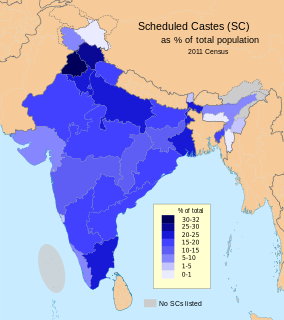 |
|---|
The Commission for the Implementation of the Constitution (CIC) of Kenya is a government Commission established under the Constitution of Kenya to ensure smooth implementation of the 2010 Constitution of Kenya.
 |
|---|
The Commission for the Implementation of the Constitution (CIC) of Kenya is a government Commission established under the Constitution of Kenya to ensure smooth implementation of the 2010 Constitution of Kenya.
The commission's roles include: [1]
The Commission will be dissolved five years after it is established or when the Constitution is fully implementation - whichever is sooner. Full implementation will be determined by Parliament but it may, by resolution, extend the commission's life.
The current membership of the Commission is as follows: [2]

In political science, an initiative is a means by which a petition signed by a certain number of registered voters can force a government to choose either to enact a law or hold a public vote in the legislature in what is called indirect initiative, or under direct initiative, where the proposition is put to a plebiscite or referendum, in what is called a Popular initiated Referendum or citizen-initiated referendum.
Freedom of information laws allow access by the general public to data held by national governments and, where applicable, by state and local governments. The emergence of freedom of information legislation was a response to increasing dissatisfaction with the secrecy surrounding government policy development and decision making. In recent years Access to Information Act has also been used. They establish a "right-to-know" legal process by which requests may be made for government-held information, to be received freely or at minimal cost, barring standard exceptions. Also variously referred to as open records, or sunshine laws, governments are typically bound by a duty to publish and promote openness. In many countries there are constitutional guarantees for the right of access to information, but these are usually unused if specific support legislation does not exist. Additionally, the United Nations Sustainable Development Goal 16 has a target to ensure public access to information and the protection of fundamental freedoms as a means to ensure accountable, inclusive and just institutions.

The Constitution of India is the supreme law of India. The document lays down the framework that demarcates fundamental political code, structure, procedures, powers, and duties of government institutions and sets out fundamental rights, directive principles, and the duties of citizens. It is the longest written national constitution in the world.

The Constitutional Court of Hungary is a special court of Hungary, making judicial review of the acts of the Parliament of Hungary. The official seat of the Constitutional Court is Budapest. Until 2012 the seat was Esztergom.

The Scheduled Castes (SCs) and Scheduled Tribes (STs) are officially designated groups of people and among the most disadvantaged socio-economic groups in India. The terms are recognized in the Constitution of India and the groups are designated in one or other of the categories. For much of the period of British rule in the Indian subcontinent, they were known as the Depressed Classes.

The Presidential Council for Minority Rights (PCMR) is a non-elected government body in Singapore established in 1970, the main function of which is to scrutinize most of the bills passed by Parliament to ensure that they do not discriminate against any racial or religious community. If the Council feels that any provision in a bill amounts to a differentiating measure, it will report its findings to Parliament and refer the bill back to Parliament for reconsideration. The council also examines subsidiary legislation and statutes in force on 9 January 1970. One member of the PCMR is nominated by the chairman to the Presidential Elections Committee, which is empowered to ensure that candidates for the office of President have the qualifications required by the Constitution. The President also appoints and dismisses the chairman and members of the Presidential Council for Religious Harmony ("PCRH"), established by the Maintenance of Religious Harmony Act, on the advice of the PCMR, and the PCMR is responsible for determining whether PCRH members who are not representatives of major religions in Singapore have distinguished themselves in public service or community relations in Singapore.

The judiciary of South Africa is the body of judges and magistrates who sit in the courts of South Africa. The judiciary is an independent branch of the government, subject only to the Constitution of South Africa and the laws of the country. The Judiciary interprets the law of South Africa, using as the basis of its interpretation the laws enacted by the South African Parliament as well as explanatory statements made in the legislature during the enactment.

The judiciary of Somalia is defined by the Provisional Constitution of the Federal Republic of Somalia. It stipulates that the national court structure is to be organized into three tiers: the Constitutional Court, Federal Government level courts, and Federal Member State level courts. A future nine-member Judicial Service Commission is empowered to appoint any federal tier member of the judiciary. It also selects and presents potential Constitutional Court judges to the House of the People of the Federal Parliament for approval. If endorsed, the President then appoints the candidate as a judge of the Constitutional Court. The five-member Constitutional Court is likewise empowered to adjudicate issues pertaining to the constitution, in addition to various federal and sub-national matters.
The Kenya National Commission on Human Rights (KNCHR) is an autonomous national human rights institution, established by the Kenya National Commission on Human Rights Act, 2011. It is a successor to the body of the same name established by an earlier Act of Parliament in 2002. The original KNCHR became operational in July 2003, and following the promulgation of the Constitution of Kenya in August 2010, was legally reconstituted as the Kenya National Human Rights and Equality Commission. The 2011 legislation restructured the body, assigning the equality function to a new National Gender and Equality Commission and reestablishing the name of the KNCHR.

The Constitution of Australia is a constitutional document that is supreme law in Australia. It establishes Australia as a federation under a constitutional monarchy and outlines the structure and powers of the Australian government's three constituent parts, the executive, legislature, and judiciary.

The Constitution of Kenya is the supreme law of the Republic of Kenya. There have been three significant versions of the constitution, with the most recent redraft being enabled in 2010. The 2010 edition replaced the 1963 independence constitution. The constitution was presented to the Attorney General of Kenya on 7 April 2010, officially published on 6 May 2010, and was subjected to a referendum on 4 August 2010. The new Constitution was approved by 67% of Kenyan voters. The constitution was promulgated on 27 August 2010.

The counties of Kenya are geographical units envisioned by the 2010 Constitution of Kenya as the units of devolved government. The powers are provided in Articles 191 and 192, and in the fourth schedule of the Constitution of Kenya and the County Governments Act of 2012. The counties are also single-member constituencies for the election of members of parliament to the Senate of Kenya and special women members of parliament to the National Assembly of Kenya. As of 2013 general elections, there are 47 counties whose size and boundaries are based on the 47 legally recognized districts of Kenya. Following the re-organization of Kenya's national administration, counties were integrated into a new national administration with the national government posting county commissioners to represent it at the counties.

The second government of Viktor Orbán or the Government of National Cooperation was the Government of Hungary from 29 May 2010 to 6 June 2014. Orbán formed his second cabinet after his party, Fidesz won the outright majority in the first round on April 11, with the Fidesz-KDNP alliance winning 206 seats, including 119 individual seats. In the final result, they won 263 seats, of which 173 are individual seats. Fidesz held 227 of these seats, giving it an outright majority in the National Assembly by itself.

The Independent Electoral and Boundaries Commission (IEBC) is an independent regulatory agency that was founded in 2011 by the Constitution of Kenya. The Commission is responsible for conducting or supervising referenda and elections to any elective body or office established by the Constitution, and any other elections as prescribed by an Act of Parliament. It was created in a provision of the 2010 constitution and the Independent Electoral and Boundaries Commission Act. Its mandate includes "the continuous registration of voters and revision of the voter's roll, the delimitation of constituencies and wards, the regulation of political parties process, the settlement of electoral disputes, the registration of candidates for elections, voter education, the facilitation of the observation, monitoring and evaluation of elections, the regulation of money spent by a candidate or party in respect of any election, the development of a code of conduct for candidates and parties, [and] the monitoring of compliance with legislation on nomination of candidates by parties."

The Public Service Commission (PSC) of Kenya is an independent government commission established under Article 233(1) of the Constitution of Kenya to manage human resources in the Kenya Civil Service and the Local Authorities.

The Parliamentary Service Commission of Kenya is one of the Independent Commissions in Kenya established under Article 127 the Constitution of Kenya to ensure smooth functioning of the Houses of Parliament i.e. Senate of Kenya and National Assembly of Kenya.

The National Police Service Commission of Kenya is an Independent government Commission established under the Constitution of Kenya to ensure smooth functioning of the National Police Service of Kenya.

The Office of the Auditor-General of Kenya is an Independent Office established under §229 of the Constitution of Kenya to audit Government Bodies and report on their management of allocated funds. The current Auditor-General is Nancy Gathungu.

The Kenya Law Reform Commission of Kenya is a government Commission established to keep under review all the law of Kenya to ensure its systematic development and reform.
In Kenya a county woman representative is a member of the Kenya National Assembly who represents one of the 47 counties in a seat reserved for female members. The county woman representatives serve in the national assembly alongside the 290 members elected from the constituencies, 12 nominated members and the Speaker of the National Assembly.
{{cite web}}: CS1 maint: archived copy as title (link)